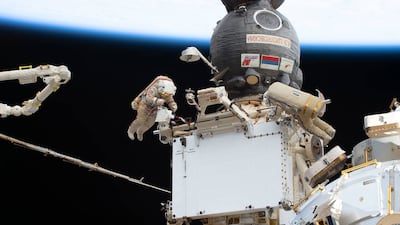The Arab world is making a name for itself in the global space race, putting a term coined for explorers from the region back in the spotlight.
The stellar feats of history-makers such as the UAE's Sultan Al Neyadi and Saudi Arabia's Rayyanah Barnawi, the region's first woman in space, could provide fresh momentum to a push to identify them as "najmonauts".
While astronaut remains the most established moniker for space travellers, Russia has its cosmonauts and China its taikonauts.
Dr Al Neyadi recently landed back on Earth after a six-month mission aboard the International Space Station, during which he became the first Arab to carry out a spacewalk.
He followed in the footsteps of Hazza Al Mansouri, who in 2019 became the first Emirati in space and the first Arab in nearly 33 years to blast off into the skies.
Saudi Arabia also sent two of its citizens into space this year, with Ali Al Qarni accompanying Ms Barnawi on an eight-day mission on the ISS.
With both countries planning to send more of its citizens to space in the coming years, should there be a dedicated word to identify these Arab adventurers?
Najmonauts
The Arab word "najm" translates to star and the Greek word "naut" means sailor.
The word "najmonaut" was created by Lisa La Bonte, a space expert, and Emirati scientist Dr Mejd Alsari.
They launched a dedicated website for the name in 2020 to help promote Arab missions and give a specific identification to space explorers from the region.
"A new name for those flying in space representing Arab states, such as "najmonaut", is an individualisation and a remark that they proudly represent states with an ancient history and culture, but also with new, special technological possibilities," the website says, quoting Dumitru Dorin Prunariu, Romania’s first cosmonaut.
"No matter what nation they belong to and how are they named, when they reach outer space they become messengers of the entire planet Earth."
The word has not been adopted legally by any space organisation and is not currently used by the space centres or agencies in the UAE or Saudi Arabia.
However, The Guardian, a newspaper in the UK, used the term in an interview with Dr Al Neyadi published this month, demonstrating it is gaining a foothold in the media landscape.
Astronauts
Those who fly to space are commonly called astronauts, with "astro" meaning star. It is unclear when the term originated.
However, some believe it was inspired by the existing term "aeronaut" that had been in use since the 18th century in relation to balloonists.
Emirati and Saudi space explorers are referred to as astronauts by their space agencies.
The US, Canada, Europe and Japan also refer to their space travellers as astronauts.
Cosmonauts
Russia refers to its astronauts as cosmonauts, as do some countries that were part of the former Soviet Union such as Kazakhstan.

Maj Al Mansouri flew on a Russian Soyuz rocket to the ISS where he then lived mostly in the Russian segment of the station.
Russian space agency Roscosmos referred to him as cosmonaut during his mission.
Taikonauts
Chinese astronauts are called taikonauts. The prefix "taikong" means space.
The term was reportedly coined in 1998, when China first started to train astronauts, and was widely used by 2003 when the first Chinese citizen, Yang Liwei, flew into space.
Today, Chinese media refer to their explorers as taikonauts.
Vyomanauts
There were reports that Indian astronauts would be referred to as vyomanauts but it is not clear whether the word is being widely used by the public.
India hopes to send its first astronauts to space in the coming years.
It is developing a rocket and spacecraft that would carry them into orbit.
India is quickly emerging as a strong player in space, having reached Mars orbit and placed a landing module and rover on the Moon's surface.



















